The product recommendations in this post are recommendations by the writer and/or expert(s)
interviewed and do not contain affiliate links. Meaning: If you use these links to buy
something, we will not earn a commission.
If you want a versatile food, look no further than sausage. Served with eggs at breakfast, tucked into a bun for lunch, or sliced up and served with pasta at dinner—sausage can easily make an appearance at every meal. Just like flavors and uses of sausage can vary, so can the healthfulness of this processed meat. Some brands are so high in saturated fat and sodium, that you’d be close to your daily limit by the time you finish breakfast. So if you eat sausage regularly, it’s important to be sure you’re choosing the best sausage brand for your health.
We asked registered dietitians for the sausage picks they recommend and like to enjoy themselves, as well as the ones they suggest steering clear of. Read on to learn more about the best and worst sausage brands, then go make a delicious meal that also complements your health goals.
How to pick the healthiest sausage
In order to make sure you’re getting the healthiest, best-quality product, dietitians recommend focusing on a few of the following factors.
Sodium: Processed meats are notorious for packing in a lot of sodium, and sausage is no different. As a preservative and flavor enhancer, some sausage can have 500 milligrams of sodium or more per serving, while others come in much lower. The Dietary Guidelines for Americans 2020-2025 recommends limiting sodium to less than 2,300 milligrams per day.
Saturated fat: One of the big health culprits of sausage can be found in the large amount of saturated fat it contains. The American Heart Association recommends less than 10% of your total calories come from saturated fat, which is only 23 grams per day on a 2,000-calorie diet. Recent research has found that saturated fat from meat may have more of a negative impact on heart health than saturated fat from dairy products, another prominent source of this type of fat.
Type of meat: Sausage is traditionally made from pork, which is typically high in saturated fat and calories. But those of us looking for a healthier sausage can choose options like turkey or chicken sausage, which tends to be lower in saturated fat and higher in protein per sausage, explains Jamie Nadeau, RDN, of The Balanced Nutritionist.
Next time sausage makes an appearance on your grocery list, give one of these healthier options a try.
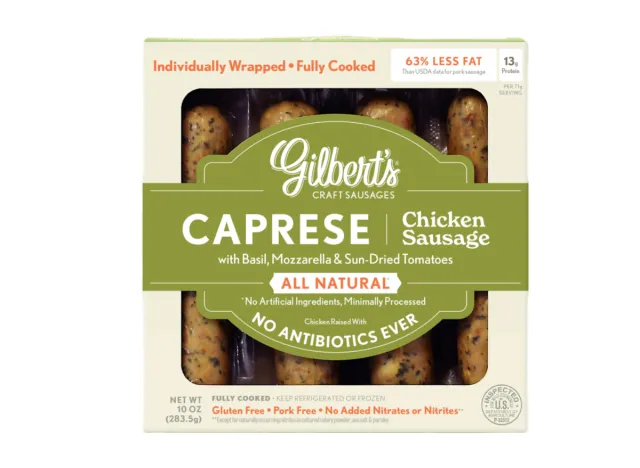

PER LINK: 130 calories, 7 g fat (2.5 g saturated fat), 530 mg sodium, 2 g carbs (1 g fiber, 1 g sugar), 13 g protein
Gilbert’s Craft Caprese Chicken Sausage has a moderate amount of sodium, with each link containing 530 milligrams of sodium, or 22% of the recommended daily limit. “Their packaging also sets them apart from other sausage brands because each sausage is individually wrapped, which makes them a great option if you only need one or two sausages at a time,” says Nadeau. “Instead of opening an entire package, you can just grab what you need.”
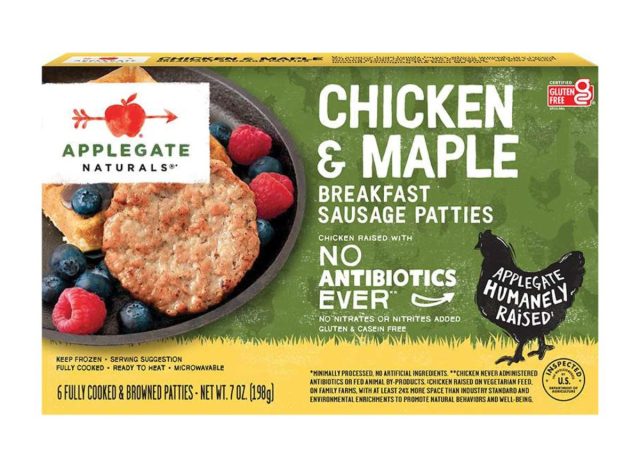

PER PATTY: 60 calories, 4 g fat (1 g saturated fat), 220 mg sodium, 2 g carbs (0 g fiber, 2 g sugar), 5 g protein
Applegate Naturals Chicken & Maple Breakfast Sausage Patties are a delicious lower-sodium, low-fat option for breakfast sausage. “These patties are made with Applegate humanely raised chickens that use zero antibiotics or hormones, boosting real, quality ingredients, with no chemical nitrates or nitrites. And, they’re totally gluten and casein-free,” says Lauren Manaker MS, RDN, LD.
Just one patty has only a gram of saturated fat and just 220 milligrams of sodium, or 10% of the recommended daily limit.
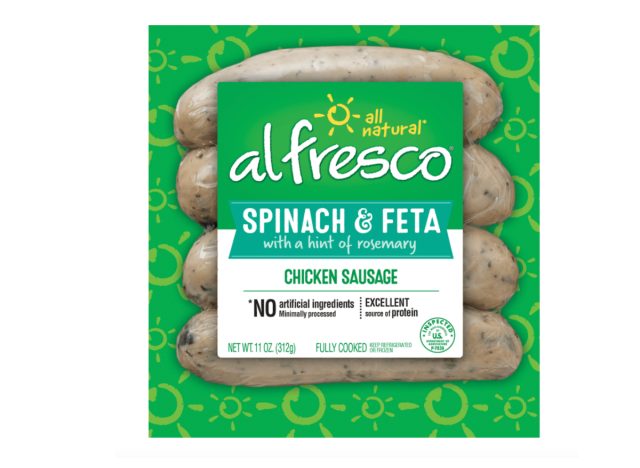

PER LINK: 120 calories, 7 g fat (2.5 g saturated fat), 390 mg sodium, 1 g carbs (0 g fiber, 0 g sugar), 12 g protein
“When it comes to sausage brands, Al Fresco All Natural Spinach & Feta Chicken Sausage stands out as an exceptional choice,” says Jessie Hulsey RD, LD, an Atlanta-based registered dietitian. One sausage has just 2.5 grams of saturated fat and only 390 milligrams of sodium, which is just 17% of the recommended daily limit.
You won’t miss the extra sodium—even without it, this sausage is superior in flavor. “Made with lean chicken meat, the Al Fresco brand takes it a step further by incorporating spinach and feta cheese, adding a delicious twist to the classic sausage,” adds Hulsey.
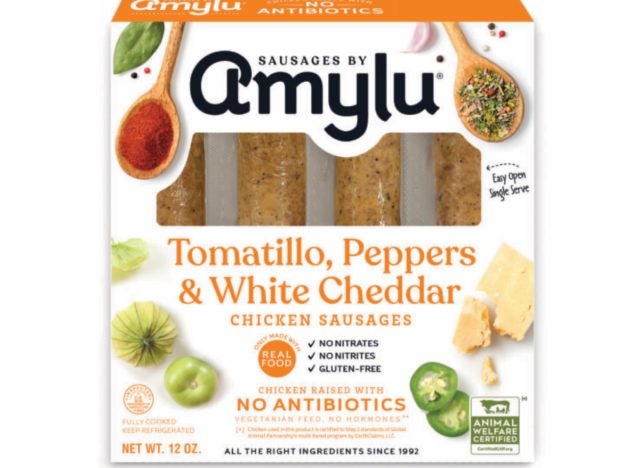

PER LINK: 120 calories, 8 g fat (2 g saturated fat), 470 mg sodium, 2 g carbs (0 g fiber, 0 g sugar), 10 g protein
“As a dietitian, I am always excited to discover sausage brands that offer a perfect balance of taste and nutrition, and Amylu Tomatillo, Peppers & White Cheddar Chicken Sausage is a standout choice,” says Hulsey. “Made with lean chicken meat and without any added nitrites or nitrates, this sausage offers a lean protein source without compromising on taste.”
This sausage is nitrite- and nitrate-free, and is also free from natural nitrite sources, like celery salt, which can react with protein in meat to have the same carcinogenic risk as synthetic nitrites.
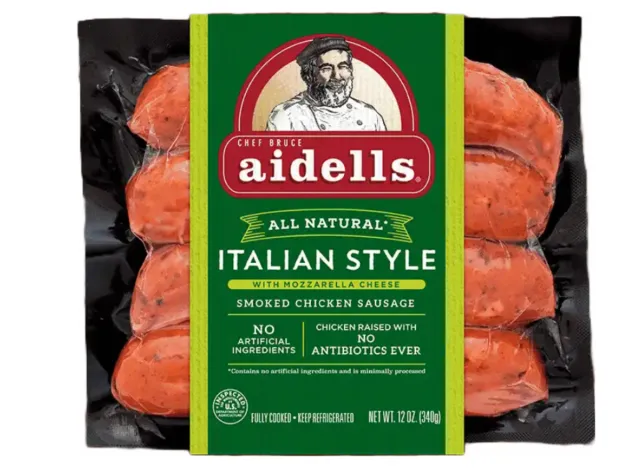

ONE SERVING: 1 link (85 g), 160 calories, 11 g fat (4 g saturated fat), 570 mg sodium, 2 g carbs (1 g fiber, 1 g sugar), 14 g protein
“Aidells Italian Style Chicken Sausage uses the best cuts of chicken and turkey, which ensures that its sausages are made with leaner meats that are lower in fat and calories compared to traditional pork sausages,” says Wan Na Chun, MPH, RD, CPT. “They use high-quality ingredients, natural spices, and real fruits and vegetables that ensure that their sausages not only taste delicious but are a healthier choice,” Chun adds.
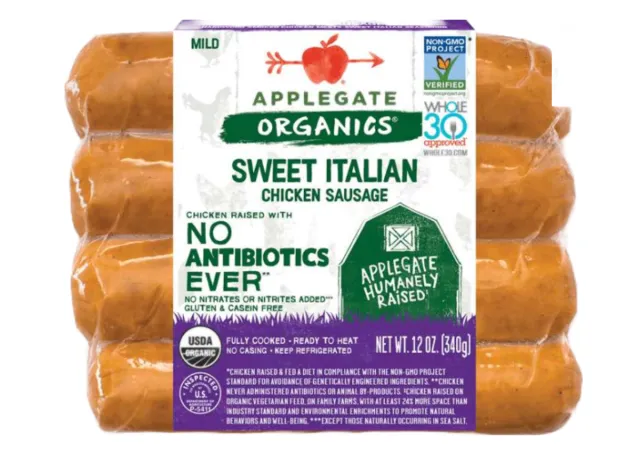

ONE SERVING: 1 link (85 g), 160 calories, 9 g fat (3 g saturated fat), 790 mg sodium, 0 g carbs (0 g fiber, 0 g sugar), 13 g protein
READ RELATED: 8 Best Summer Deals You'll Find at Sam's Club Right Now
“For dinner options, I like the Applegate Organics Sweet Italian Chicken Sausages because of the ingredients, nutrition, and the great taste,” says Nadeau. One sausage link has 160 calories, 13g of protein, and zero added sugars. Plus they’re allergy friendly, as most of their chicken sausages are gluten-free and dairy-free, with the exception of their spinach and feta flavor, adds Nadeau.
They’re low in saturated fat, with only 3 grams per sausage link, but a little higher in sodium, with 34% of the recommended DV in just one link. Sticking to one sausage and rounding out the meal with lower-sodium options is a good idea.
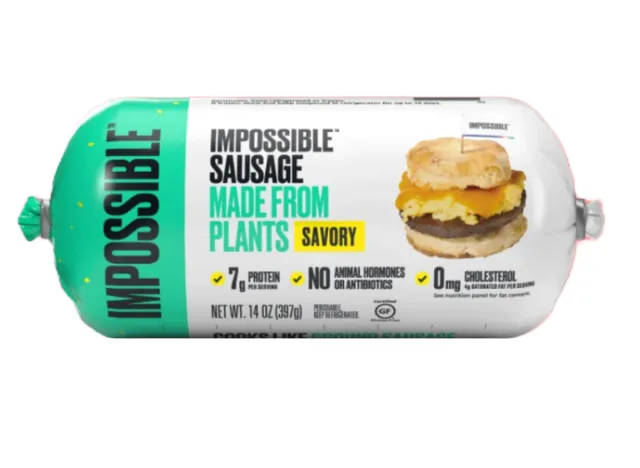

ONE SERVING: 2 ounces (56 g), 130 calories, 9 g fat (4 g saturated fat), 380 mg sodium, 5 g carbs (1 g fiber, 0 g sugar), 7 g protein
This plant-based bulk sausage can be crumbled or formed into a patty, making it a versatile addition to any plant-based refrigerator. “Impossible Ground Savory Sausage contains 43% less saturated fat and 47% less fat, no cholesterol, and no animal antibiotics or hormones,” says Malina Malkani, MS, RDN, CDN.
This plant-based sausage option is comparable in calories and fat to many chicken sausage varieties and has only 380 milligrams of sodium, or just 16% of the daily value.
Worst sausage brands
You may want to leave these sausage brands on the shelves, and choose one of the healthier options above instead!
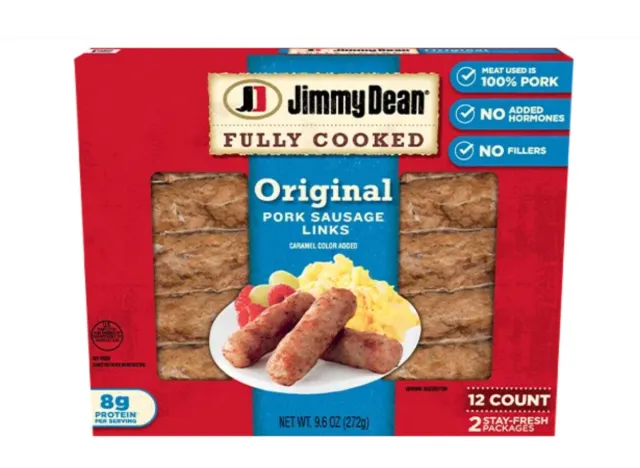

ONE SERVING: 3 links (68 g), 270 calories, 26 g fat (9 g saturated fat), 490 mg sodium, 1 g carbs (0 g fiber, 1 g sugar), 8 g protein
Although this Jimmy Dean breakfast sausage may be convenient, its incredibly high fat content makes it a less than optimal choice. Just one serving has 26 grams of fat, including 9 grams of saturated fat, which is 39% of the recommended daily limit; that doesn’t leave much room for the rest of the day’s meals. The high sodium and saturated fat content makes this breakfast sausage a poor choice for anyone with heart disease or who is concerned with overall fat or sodium intake, explains Joanna Ayalloore MS RD LDN.
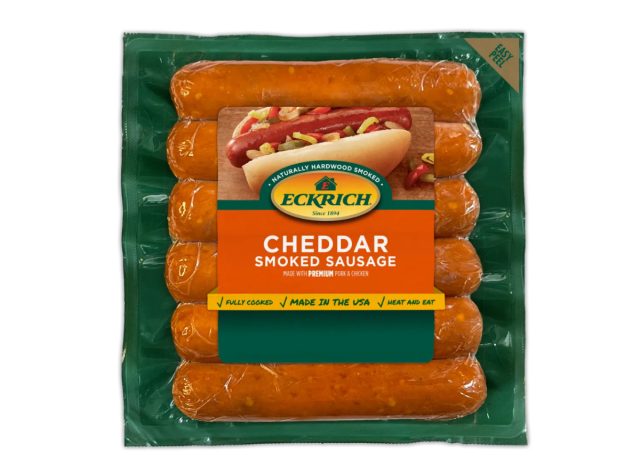

ONE SERVING: 1 link (65 g), 230 calories, 19 g fat (6 g saturated fat), 670 mg sodium, 6 g carbs (0 g fiber, 0 g sugar), 7 g protein
Eckrich Cheddar Smoked Sausage is made from pork and mechanically separated chicken, while also containing several preservatives like MSG, sodium nitrite, and more. With 230 calories, 19 grams of fat, and only 7 grams of protein, we recommend opting for a healthier sausage with more protein.
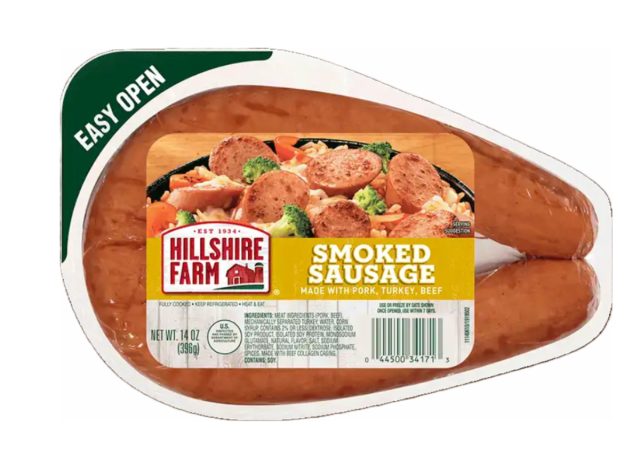

ONE SERVING: 2 ounces (56 g), 170 calories, 15 g fat (5 g saturated fat), 530 mg sodium, 3 g carbs (0 g fiber, 2 g sugar), 7 g protein
“Hillshire Farms Smoked Sausage includes ingredients like mechanically separated turkey, which can be a concern due to its high processing and potential loss of nutritional value,” says Hulsey. “While it’s important to enjoy sausage in moderation, I recommend exploring alternative options that prioritize leaner cuts of meat and minimize the use of artificial additives for a healthier and more balanced diet.”
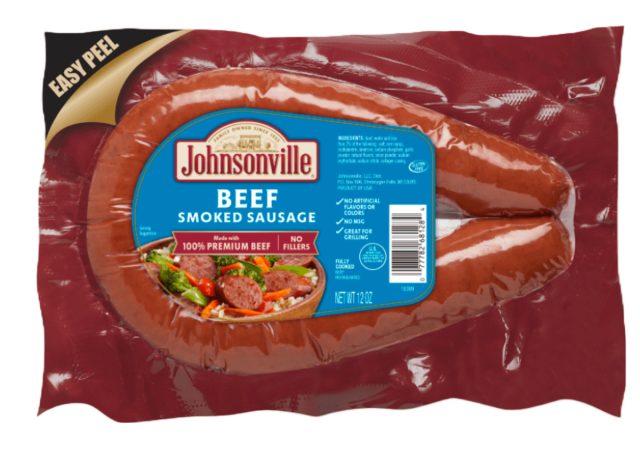

ONE SERVING: 2 ounces (56 g), 170 calories, 15 g fat (6 g saturated fat), 530 mg sodium, 2 g carbs (0 g fiber, <1 g sugar), 7 g protein
Beef sausage isn’t inherently bad, but Johnsonville Smoked Beef Rope Sausage has 6 grams of saturated fat per serving, which is 26% of the recommended daily limit. Plus, there are only 7 grams of protein in each serving, which makes it more likely you’ll eat more than one serving of this sausage at a time if it’s the main protein source of your meal.
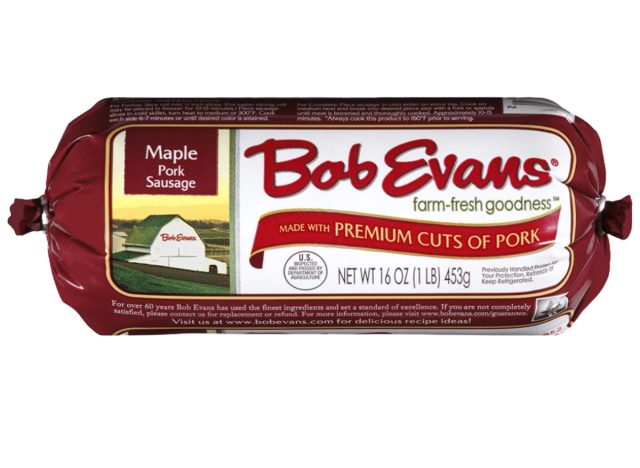

ONE SERVING: 2 ounces (56 g), 230 calories, 20 g fat (7 g saturated fat), 370 mg sodium, 3 g carbs (0 g fiber, 2 g sugar), 10 g protein
This breakfast sausage is high in fat and includes 3 grams of added sugar. Just one serving has 7 grams of saturated fat, or 30% of the recommended daily limit. It also includes artificial caramel coloring and preservatives like MSG. In other words: steer clear.
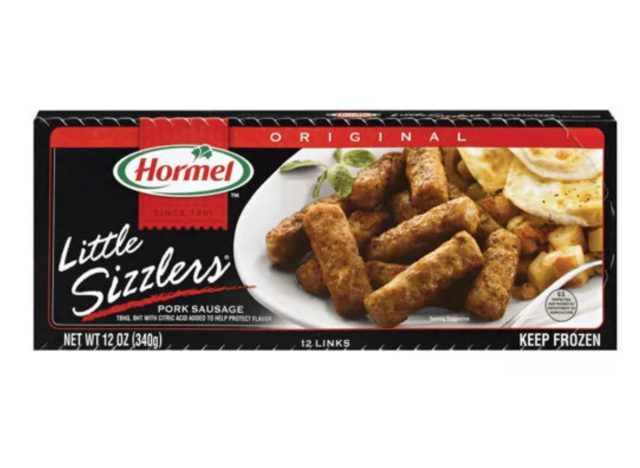

ONE SERVING: 3 links (46 g), 200 calories, 19 g fat (7 g saturated fat), 580 mg sodium, 0 g carbs (0 g fiber, 0 g sugar), 8 g protein
Like many other sausage brands, these pre-cooked breakfast sausages are high in saturated fat and sodium. But Hormel Little Sizzlers also contain the preservatives BHT and TBHQ, which aren’t found in any others on our list. These preservatives have been associated with toxic effects in rats, including liver and kidney damage. It’s important to note that these effects are dose-dependent, but some people may choose to limit exposure to these preservatives by choosing products without them.










